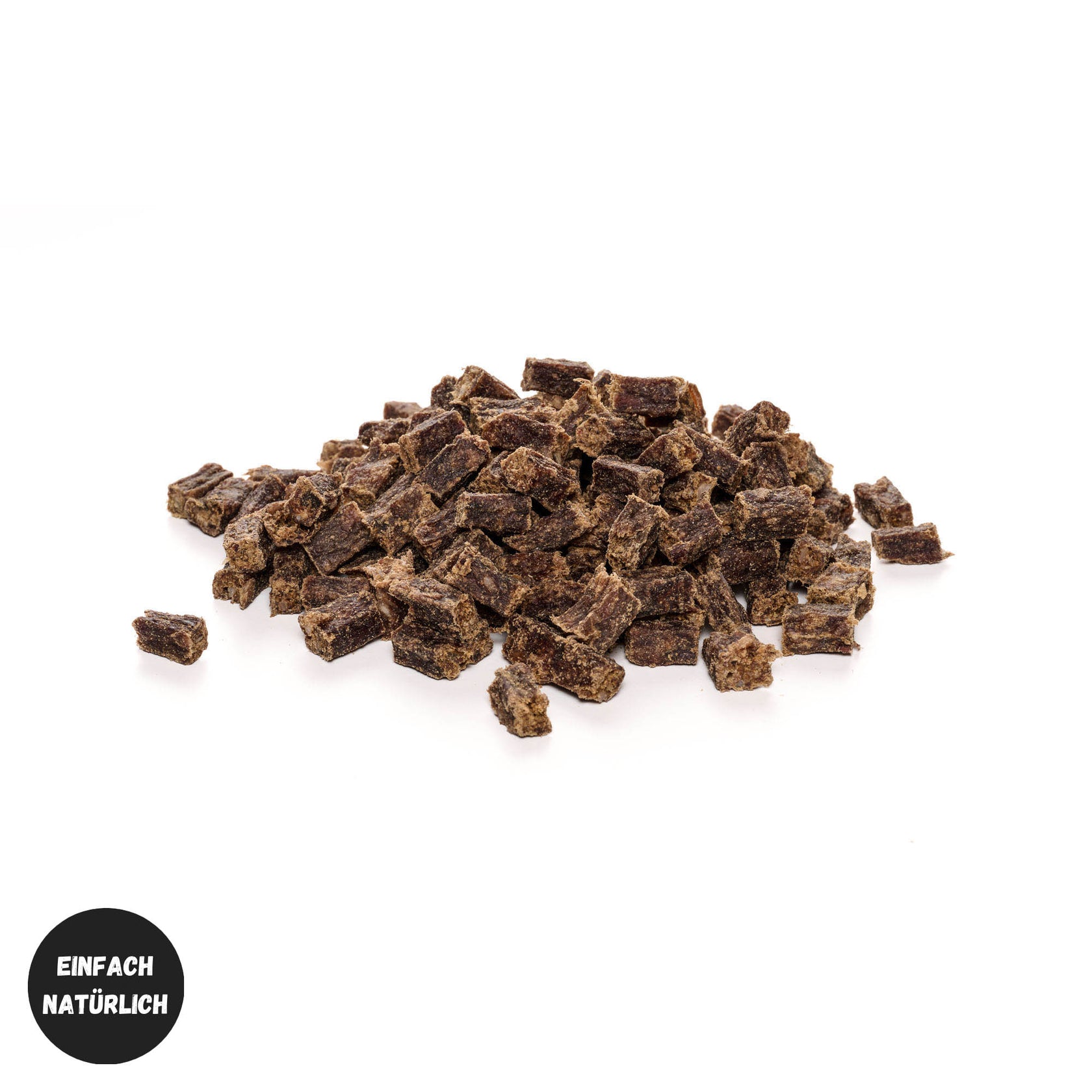
Everything about puppies: From selection to training
Share
A puppy can not only enrich your life but also be a source of immense joy and companionship. Deciding to bring a puppy into your family is a significant step full of responsibility and joy. A puppy not only brings playful energy and innocence into your home but also demands patience and care.
It's a journey filled with challenges and discoveries as you and your puppy grow and learn together. The bond that forms is often deep and rewarding, making up for the struggles of the first few days and weeks. Prepare to learn a lot, laugh a lot, and maybe even despair a little - but most of all, prepare to be loved by a little being who puts his whole world in your hands.
Contents: Everything about puppies
- Choosing the right puppy
- The first days at home
- Food and health
- The basics of dog training
- Socialization and training
- Common challenges
- Conclusion
Choosing the right puppy
Considerations before selection
Before choosing a puppy, think carefully about your living situation, your available time and your social environment. Living in a small apartment or a large house with a garden will place different demands on the breed and size of the dog. The amount of time you can devote to caring for and training the dog each day is also crucial. Dogs are social animals that need a lot of attention and interaction. If you are out of the house for much of the day, you may need a breed that is more independent or requires less exercise.
Additionally, your social environment plays an important role. Do you have children or other pets? Some dog breeds do better in a busy household, while others may prefer a quieter environment. All of these factors need to be considered to figure out which dog breed is right for you . This is crucial because choosing the right breed can affect not only the dog's well-being, but also the happiness of your entire family.
Discover natural and healthy chews for your puppy in our shop!
Where to find a puppy
You can find a puppy from a recognized breeder, at an animal shelter or through private placement. It is crucial that the animals are healthy and well socialized to ensure a smooth transition to your home. When choosing a breeder, you should make sure that they are reputable and that the animals grow up in a clean, healthy and loving environment. A good breeder will be happy to answer any questions you have about care, the history of the parents and health checks.
Animal shelters are also an excellent option for giving a dog a new home. Many shelters offer a wide range of dog breeds and mixed breeds waiting for their chance to be adopted by a loving family. Shelter staff can often provide valuable insight into the animals' behavior and needs, as they work with them on a daily basis.
Private placements can be another option for finding a puppy. These often arise when dog owners can no longer care for their puppy for various reasons. With such placements, it is important that you receive precise information about the puppy's health and living conditions.
Regardless of which source you choose, it is important to personally check how the puppies are kept and make sure they are healthy and in a nurturing environment. This will help you choose a healthy and happy puppy that will fit well into your lifestyle.
The illegal puppy trade, especially in Eastern Europe, is a serious problem and should be avoided at all costs. Many of these puppies come from so-called "puppy factories" where the animals are kept in terrible conditions. These practices not only lead to health and behavioral problems in the animals, but also support an industry that disregards animal welfare and is solely focused on profit. Purchasing a puppy from such sources would further support these unethical businesses.
Health checks and first steps
Make sure the puppy is vaccinated and has been thoroughly examined by a vet. This is a fundamental step to ensure the puppy's health. This examination will include basic health checks to ensure the puppy does not have any obvious canine diseases or congenital defects. It is also important that the puppy has been dewormed and treated for parasites such as ticks .
The first days and weeks after moving into your home are crucial for the health and well-being of the puppy. During this time, you should pay particular attention to signs of stress or illness, as the transition and adaptation to a new environment can be challenging for a puppy. If in doubt, you can also calm your four-legged friend with the right tips!
It is also important to get the puppy used to regular vet visits during this early stage. Also, schedule vaccinations according to the vaccination schedule your vet will recommend. This will protect the puppy from common dog diseases and ensure that he can live a healthy and long life.
In addition to medical aspects, start early with social imprinting and easy familiarization with basic commands. These first lessons are crucial for developing a good relationship between you and your puppy and for his future adaptability and behavior.
The first days at home
Preparing the house
Before your new puppy moves in, it's important to prepare your home accordingly. Start by making your home safe by keeping dangerous items out of reach, such as poisonous plants, small objects that could be swallowed, and electrical cords. This can help prevent dog poisoning - or other accidents. Also check fences and gates to make sure your puppy can safely play in the yard without escaping.
A cozy place to sleep is also important. Choose a quiet place that is free from drafts and provide a comfortable dog bed or crate with soft blankets. This will help the puppy to feel safe and secure. Also think about water bowls and food bowls as well as some safe toys to keep the puppy occupied. It's best to take a look here: Puppy equipment - what does a puppy really need?
The arrival
The arrival of a new puppy is an exciting event. It is normal that the puppy may be hesitant or anxious at first. Give him time to settle in at his own pace and explore the new surroundings. Keep the environment quiet and avoid excessive noise or too much activity that could overwhelm the puppy. It is helpful to delay visiting friends or large family gatherings until the puppy has settled in.
Acclimatization of the puppy
The first few days in a new home are a big deal for a puppy. Get your puppy used to his new home slowly and patiently. Establish a routine from the start with regular feeding times, walks and rest times. This gives the puppy structure and helps him gain confidence in his new surroundings.
Start gentle dog training early to practice simple commands like "sit" and "stay." Using positive reinforcement, like praise and dog training treats , will help the puppy see these lessons as positive experiences. Make sure all family members use the same rules and commands to avoid puppy confusion and create a consistent learning environment.
Discover natural and healthy chews for your puppy in our shop!
Food and health
Basics of puppy nutrition
A balanced diet is crucial for the puppy's growth and development. Choose high-quality puppy food that is specifically formulated for the needs of young dogs, and follow feeding recommendations based on your puppy's weight and breed. In addition to the main diet, chews and training snacks can be a great way to promote dental health while also serving as effective training aids. Make sure these snacks are high quality and are included in your puppy's daily calorie intake.
For puppies with special dietary needs, such as allergies or intolerances, hypoallergenic dog food is a good alternative. These are often free of common allergens such as wheat, soy or certain proteins and can help prevent skin and digestive problems . It is important that you pay attention to the ingredients when choosing snacks and choose products that support the healthy development of your puppy.
The basics of dog training
Importance of consistency and patience
Training a puppy requires a lot of time, patience and, most importantly, consistency. It is crucial that you stick to your rules and be a reliable leader for your puppy. Consistency helps the puppy develop confidence and understand what is expected of them. Clear and consistent communication reduces confusion and aids the learning process. Remember that every puppy has their own pace. Showing patience when progress is slower than expected is important for a stress-free learning experience for both you and your puppy.
Basic commands
Teaching basic commands like 'sit', 'down' and 'come' is an essential part of early dog training. Not only are these commands practical in daily life, but they also strengthen the bond between you and your puppy. Start with simple commands and use positive reinforcement like praise or treats to reward good behavior. This will not only encourage the desired behavior, but will also make training a pleasant experience for your puppy. Over time, more complex commands and tricks like giving paw can be introduced, which will encourage mental stimulation and further deepen the relationship.
Socialization and training
Importance of early socialization
Early socialization is crucial to developing a well-adjusted and sociable dog. Start introducing your puppy to different people, other animals and new environments from a young age. This will help prevent fear and aggression and encourage positive behaviors. Events such as puppy playgroups and visits to dog-friendly parks provide excellent opportunities for your puppy to develop important social skills.
Tips for successful training
Successful training is based on consistency, patience and the use of positive reinforcement. Use rewards such as puppy chews , praise and playtime to reward your puppy for correct behavior. Avoid harsh punishments as these can damage trust and are often counterproductive. Instead, ignore or redirect unwanted behavior and consistently reinforce desired behavior. This will help your puppy learn what is expected and strengthen your bond.
Common challenges
Dealing with biting and chewing
Young dogs use their mouths to explore the world, which can lead to unwanted biting and chewing. While it's important for puppies to develop their teeth and strengthen them through biting, it's also important to set boundaries early. Offer appropriate, solid chews, such as bones or antlers . When your puppy begins to chew on unwanted objects, gently redirect his attention to his toys. This will teach him what is acceptable to chew and what is not.
House training
Housetraining your puppy is often a challenge, but with consistency and a set schedule, it is manageable. Take your puppy outside regularly after sleeping, eating, and playing to give him the opportunity to relieve himself. Praise him every time he does his business outside. If accidents do happen, react calmly and clean the area thoroughly to prevent your puppy from repeatedly marking there. A regular schedule and lots of patience are keys to housetraining success.
Conclusion
Bringing a puppy into your life brings both great responsibility and immense joy. With the right preparation and information, you and your puppy can have a wonderful time together. Early socialization, consistent training, and an appropriate diet are essential to keeping your puppy healthy and happy. If challenges arise, don't hesitate to seek professional help from trainers or veterinarians. With patience and love, your puppy will quickly become more than just a pet; he will become an indispensable part of your life.









